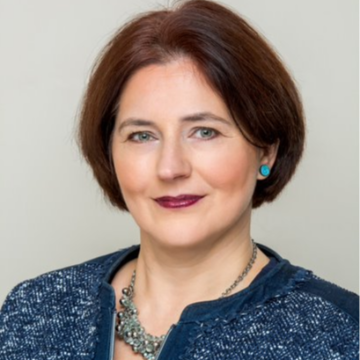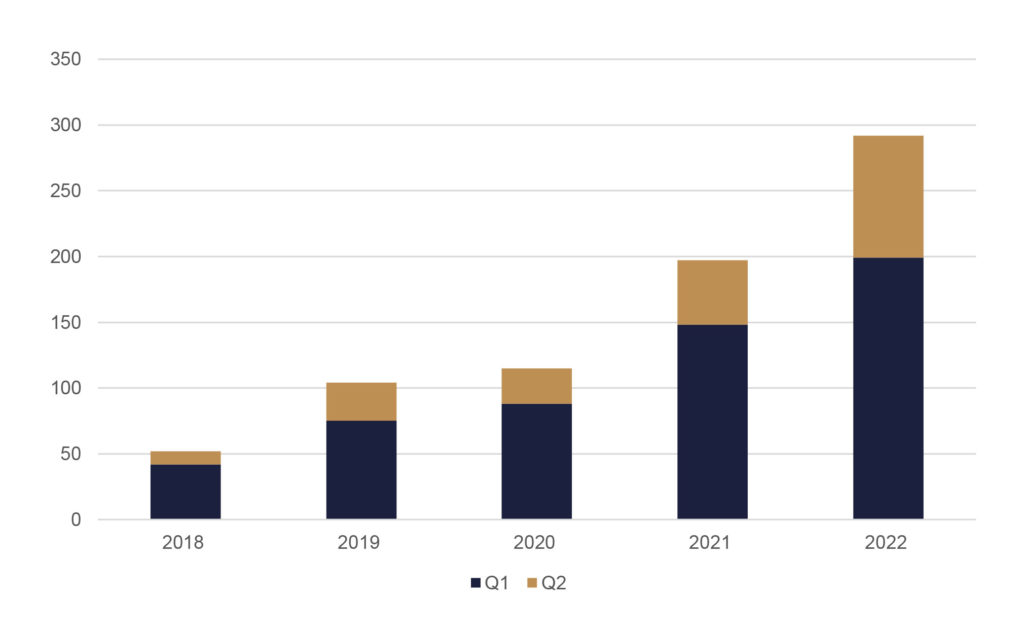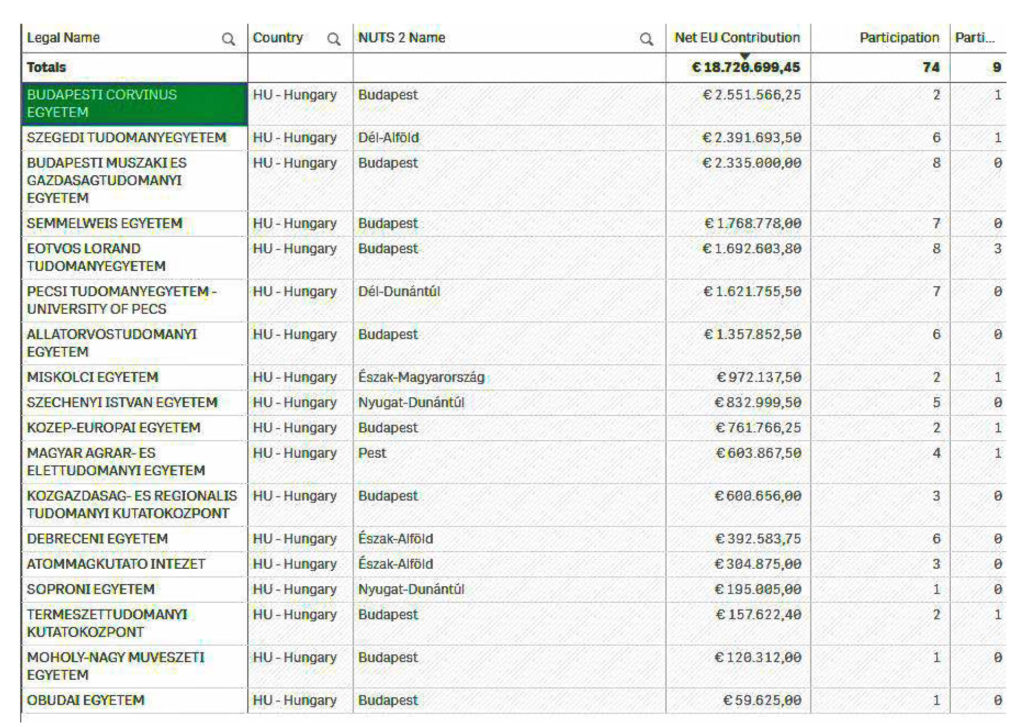Tamara Keszey: Our objective is to add ourselves to the map of international researches

Over the past years, research and publication activities at the University have improved a lot. The best proof of that is the fact that the number of Corvinus authors’ articles of Q1 and Q2 ratings in international journals has grown fivefold within five years. In 2022, altogether 292 such articles were written, and one third of them were co-authored by foreign researchers. This is one of the points in the report to be presented soon to the Senate, analysing the research, publication and international tender activities of the Corvinus.
’The firm development of researchers’’ abilities over the past years is a particularly good result in the light of the fact that five years ago the Corvinus was a university with traditional teaching focus. I have to point out the development of doctoral students, because one third of the Q1-Q2 publications issued last year were produced with the involvement of students attending the doctoral programme’, adds Tamara Keszey Vice-Rector for Research.

Most articles published in international cooperation were produced jointly with researchers working at the Babes-Bolyai University, the Erasmus University Rotterdam and the Indonesian President University. Among the authors of articles co-authored with foreign authors, part-time Corvinus researchers, who work for a research institute, too, in parallel with their job at the University, are overrepresented. Tamara Keszey thinks that the Corvinus still has a lot to do in this area: „in the near future, our objective is to improve the international connections of full-time colleagues, too”.
The topics and the international journals in which the Q1-Q2 publications of Corvinus authors were published were also analysed. Based on the quick analysis of publications in international journals in 2022, the University has internationally visible research performance mainly in the fields of health economics, mathematics, political science, economics, marketing, energetics, finance, sociology, as well as social networks, food industry and agricultural economics, big data, sustainability and management. However, Tamara Keszey added the following: ‘a complete picture, however, requires a longer time period, the analysis of publications from multiple aspects, as well as validating methodologies and the involvement of markers beyond the journal articles.’
Built-in incentives, research instrument developments
It is a strategic objective of the University to produce internationally visible research results, and to that end, a lot of developments have been realised in research support over the past three years. By now, the availability of instruments, journals and databases at the Corvinus can be qualified as good, even in international terms, and, at the same time, a more accurate data processing and monitoring system has been established to register Corvinus publications. There are regular internal knowledge-sharing trainings, research methodology workshops held under the leadership of foreign researchers, and the University supports the attendance of prestigious foreign conferences. These possibilities are available to all the colleagues through an open system of calls for applications, and the body consisting of the members of the research committee makes decisions about submitted applications with weekly frequency.
The Corvinus Onmibus service has also been available to the researchers of the University since last year. ‘We wish to facilitate researchers’ data collection activities with this possibility. The Corvinus subscribes to a representative sample of 1000 people, and the colleagues may apply, with their own questionnaires, for inquiries on this consumer sample. The key advantage of this service is that there is no administrative burden whatsoever on them. They submit their questionnaire, and in the next step they get the complete database, which they can analyse with their own methods.’
The leadership of the University rewards outstanding individual publication performances financially, too. ‘This will be the third year when we hand out Corvinus Research Excellence (CRE) prizes in various categories, recognising the performance of researchers publishing in world class international journals with a higher amount. In answer to the call in this year, more than one hundred applications were submitted’, says the Vice-Rector for Research about the incentive effect of the CRE.
How to proceed with international applications?
Both the ratio and the value of international academic calls for applications are on the increase, compared to the revenues of domestic calls. In earlier EU framework programmes, the Corvinus won more tenders of lower values, but in recent years, the amounts available in individual calls have started to grow gradually. ‘The colleagues have more initiative now, and have been more confident in submitting applications over the past years. Nowadays there are more and more calls in which the Corvinus is a key player in a consortium. In 2020 and 2022, in the capacity of consortium leader, we managed to win grants of high amounts, what is more, last year the Corvinus was the university that won the most EU grants in Hungary’, explains Tamara Keszey, adding immediately that in this progressive period, the decision made by the European Council on December 15 last year – that might have an impact on the applications of the University in the near future – is especially painful. ‘We do hope that this prohibition will soon be lifted, but we encourage our colleagues to apply for grants in the meantime anyway. It is not clear for a lot of people that in spite of this regulation, they can still submit applications, and if a project wins, we consider our options. The University has worked out several scenarios for the implementation of winning applications in the present situation, and the announcement made by Balázs Hankó, State Secretary for Higher Education on March 14 is also encouraging, as it says that the Government will provide an instant support of HUF 5 billion to pre-finance the Horizon Europe research programmes of model-changing universities.

Plans and objectives for this year: ERGO from May
A key objective for the near future is to achieve a stronger international presence. The leadership of the University wishes to support international calls for applications by setting up a new office called European Research Grant Office (ERGO) instead of the former Horizon Europe Centre in May. Under the leadership of the Vice-Rector for Research, this will include all tender groups of the University so far working in separate organisational units. The objective is to concentrate administrative tasks and the knowledge related to implementation at one place, from writing the application to implementing the project won.
‘While our researchers are very confident in submitting applications for a domestic OTKA (Hungarian Scientific Research Fund) call, we can see that there is less experience yet in the case of international calls, and in many cases, the colleagues are afraid of administration, too. In this new office we hope to be able to give all the assistance to submitting applications, and release the colleagues from administrative burdens, so that they could focus on the research only’, says Tamara Keszey about the transformation to be implemented in May.
In ERGO, customised support and advice is given to the colleagues, from the creation of a researcher profile on international platforms, through the establishment of international research connections, to the submission of specific applications.
In 2023, another objective of the research support area is to add the University to the international scientific map. ‘We wish to make our key research groups visible, and introduce our top researchers and researches. In other words, we wish to draw our own research map. This is important so that foreign researchers could know the fields in which they can cooperate with Corvinus colleagues.. In addition, we wish to open to the non-professional audience interested in science, too, by clearly presenting the researches conducted at the University’, says the Vice-Rector about the priorities of this year.